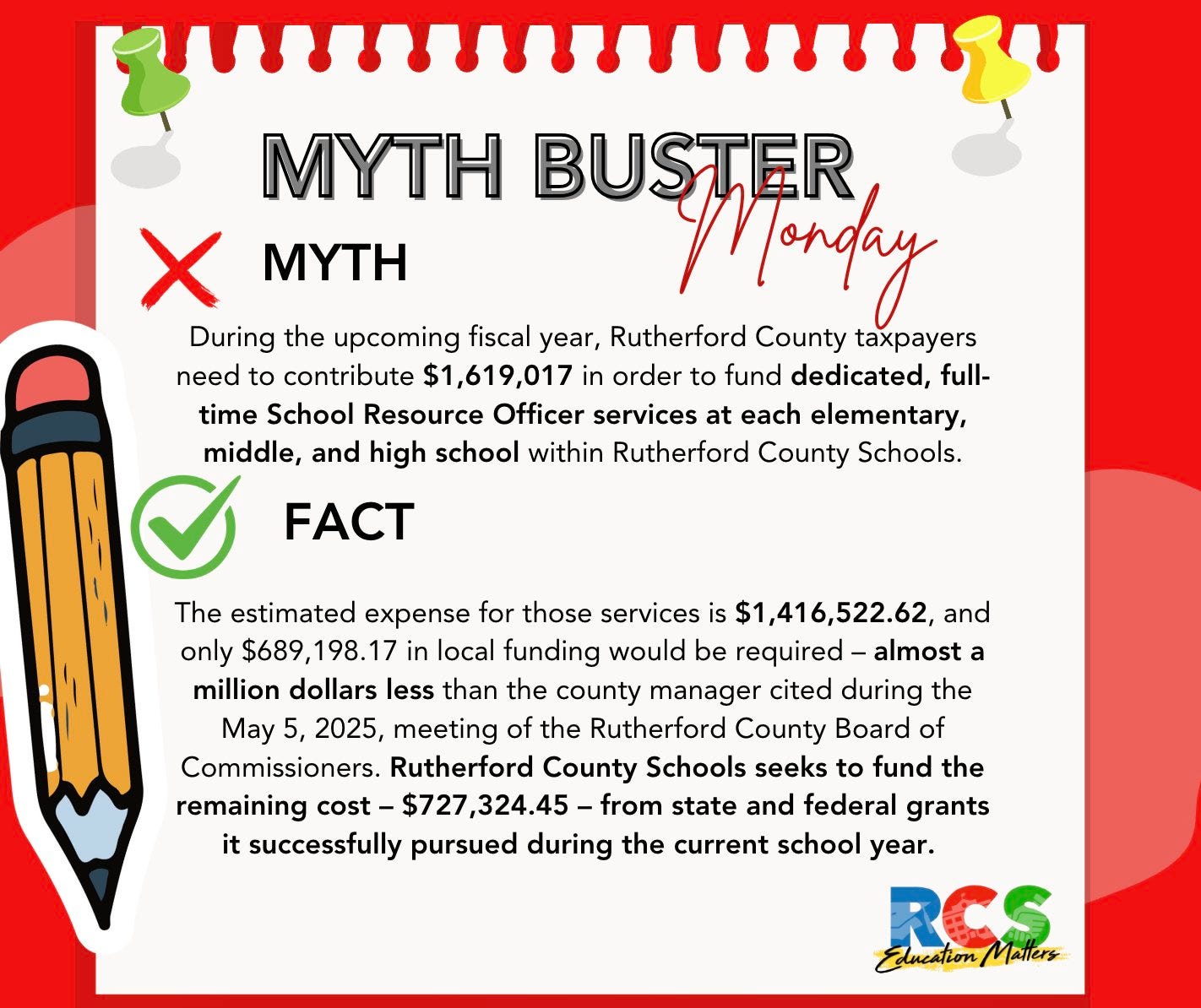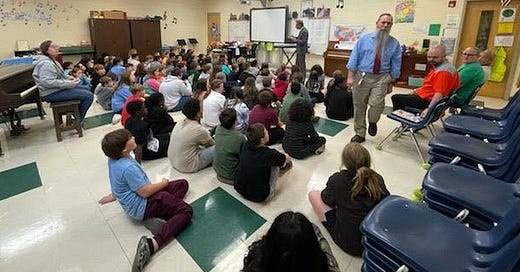Producing high-quality, in-depth news takes significant resources. At Lake Lure News / Cops & Congress, facts come first, followed by in-depth commentary and analysis. Your subscription helps support independent journalism that brings you closer to the decisions shaping the community and ensures I can continue delivering the stories that matter most.

FOREST CITY, N.C. — At a special meeting on May 19, the Rutherford County Board of Education voted to reduce its Local Current Expense (LCE) budget request for 2025–26, cutting nearly $1.5 million from the county manager’s proposal and scaling back its own earlier ask.
I livestreamed the meeting on Facebook for Cops & Congress followers, and due to spotty internet in the room, the official recording is also being shared here. (It gets deleted by the school board after two meetings.) Facebook will auto-delete them after 30 days. I’ve included copies of both livestreams for archival purposes - watch part 1 here and part 2 here.
The board’s revised request totals $22.48 million and reflects substantial changes, including the use of existing grants to reduce the need for local taxpayer funding. But it also raised eyebrows—and questions—across the county, especially regarding School Resource Officer (SRO) funding.
“The FY 2024-2025 Local Current Expense Fund budget is supported by approximately $5M in nonrecurring revenue from multiple sources, including:
• The sale of surplus properties to the Town of Rutherfordton;
• The sale of surplus properties to the County of Rutherford;
• The expenditure of remaining ESSER III (COVID-19) funds; and
• Residual revenue accruing from the sale of surplus computer devices.
Failure to replace that nonrecurring revenue with recurring revenue necessarily requires the elimination of equivalent spending.”
Rutherford County, NC Schools (RCS) received federal Elementary and Secondary School Emergency Relief (ESSER) funds through the American Rescue Plan (ARP) to help address the impacts of the COVID-19 pandemic. These funds supported initiatives like summer learning, extended day programs, and student mental health services. RCS was allocated nearly $22 million in ESSER III funding and has documented its spending through public plans, needs assessments, and health and safety reports, as required by the North Carolina Department of Public Instruction (NCDPI). With the funds set to expire, district leaders are warning of a potential “funding cliff” and have launched the Education Matters campaign to advocate for continued investment in public education.
What Changed in the School Budget?
📌 Superintendent Dr. David Sutton’s new proposal includes:
$20.3M in operational funding (unchanged from county manager’s proposal)
$689K in local funding for SROs, down from $1.62M, due to $727K in available state and federal grants
$1.48M for teacher salary supplements, raising each eligible teacher’s bonus from $1,100 to $2,000
The Board emphasized its opposition to a proposed tax increase and argued that adequate school funding is possible through existing revenues. Sutton also pointed to a growing county fund balance as justification for reducing reliance on new taxes.
A significant factor contributing to the current financial pressures on RCS is a gradual decline in student enrollment over the past 15 years. This shift reflects a combination of demographic trends, such as the county’s relatively flat population growth and the increasing availability of educational alternatives, including charter schools, private schools, and homeschooling. In addition, state-funded scholarship and voucher programs, which aim to expand school choice for families, have redirected some public education dollars to private institutions.
In Rutherford County, these include charter schools (Lake Lure Classical Academy and Thomas Jefferson Academy) and private schools (Word of Faith Fellowship Christian School, Trinity Christian School, and Master’s Academy). Enrollment in Charter Schools has increased 352% from 2012-2025, according to a report from NCDPI. Allotted average daily membership (ADM) dropped from 9,666 in 2008–09 to 7,147 in 2024–25. However, the district reported a slight increase this year, with ADM reaching 7,171—an encouraging shift, according to Superintendent Dr. David Sutton. Charter schools saw a decrease of 81 students from the previous school year, down to 1,239, according to the NCDPI report.

Sheriff’s office sets the record straight
The Rutherford County Sheriff’s Office (RCSO) responded to growing public discussion about the SRO funding numbers, issuing a statement that clarified several points of confusion.
“The claim about a $790,000 grant only being available if the schools pay for SROs is a misunderstanding,” the statement read. “Many grants require a local match or commitment to sustain the program.”
The Sheriff’s Office explained that its $1.6 million request includes all public school SROs, not just those assigned to Rutherford County Schools. That total also covers SROs for Thomas Jefferson Classical Academy and Lake Lure Classical Academy—two charter schools not included in the school board’s revised figure of $1.4 million.
RCSO also cautioned against the assumption that visiting patrol deputies can replace full-time SROs:
“An SRO is a full-time, assigned officer whose primary responsibility is that specific school... In a critical incident of violence, it is of the utmost importance to have law enforcement present. Seconds save lives.”
The agency also noted that a lack of clear communication has created confusion:
“Unfortunately, the lack of communication and explanation from Rutherford County Government to Rutherford County Schools has created confusion. Clear and consistent communication between all involved parties – the County Commissioners, County Manager, the Sheriff's Office, and Rutherford County Schools – is vital to ensure transparency and understanding for our community.”
So, where do we go from here?
The revised school budget, which notably delayed addressing the expiration of $5 million in one-time COVID-19 relief funds, is now on the table. But the sudden shift, just two weeks after the county manager’s budget was presented, has raised concerns about transparency and planning.
With the next county budget workshop set for Monday, May 27, several key issues remain unresolved:
Will the commissioners adjust the SRO funding line to reflect the Sheriff’s broader request?
Can the school board’s proposed teacher raises be sustained in future years?
And why didn’t this revised strategy—using grant offsets and reducing supplemental costs—come up in the first place?
Opinion & Analysis: Cops & Congress Commentary
No One Wants Higher Taxes—But Tough Choices Are Here
Three Questions as Commissioners Meet Again May 27
Rutherford County leaders have made it clear: they don’t want to raise taxes. Most residents don’t either. But balancing a budget under state law requires hard decisions, especially when safety and fiscal responsibility are both at stake.
Here are three fair questions as commissioners head into next Tuesday’s workshop:
1. Can the county fully fund school safety without new taxes?
The sheriff says $1.6 million is needed to cover SROs at all schools, including charters. The school board proposes less by using grants. Will the board bridge the difference, or leave some schools without full-time protection?
2. How long can savings cover recurring costs?
Tapping into reserves might work this year, but it’s not a long-term plan. Will leaders commit to sustainable budgeting or delay the problem?
3. Will anyone clearly explain the trade-offs?
Taxpayers deserve honest, straightforward answers—not mixed messages. It’s time for clear leadership and clear math.
I’ll watch closely and continue to ask those questions on your behalf. Stay tuned. Catch up on past reporting, budget documents, and meeting replays in the Cops & Congress archives.
📌 Document obtained exclusively by Cops & Congress.
Support this public-interest reporting by sharing this article and subscribing to Cops & Congress — your trusted source for truth in local government.
Thank you for reading and watching. Learn more about this newsletter and my background. I am guided by the Society for Professional Journalists’ Code of Ethics. Follow me on X (Twitter), Facebook, LinkedIn, TikTok, and YouTube. Send constructive criticism, fan mail and tips with public documents for future stories: CopsandCongress@gmail.com.












Share this post